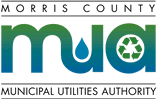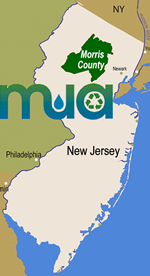Transfer Station Info (Tip Fee $113.00/ton)
- Mt. Olive Mon-Fri 7:30am-3pm; Sat 7:30am-11am
- Parsippany Mon-Fri 7am-3pm; Sat 7:30am-11am
- Closed Sundays and Major Holidays
- No Rental Trucks
- Payment by Account, Check, Credit Card. No Cash

Water Conservation Practices
Due to chronic drought conditions, on February 27, 2002 the Morris County Board of Chosen Freeholders adopted a proclamation declaring a water emergency in Morris County. The MCMUA worked with the Board of Chosen Freeholders in drafting the suggestions provided below on how individuals can reduce their use of water and thereby minimize their contribution to drought conditions.
General
- Check faucets and pipes for leaks and repair them if necessary. Turn off faucets securely when not in use, a dripping faucet wastes about 20 gallons a day, a small steady leak wastes hundreds of gallons a day every day.
- Letting water run from a faucet until it gets hot is a waste, capture the water for other uses like watering house plants, filling buckets for cleaning, etc…
-
Serve water at restaurants by request only.
Bathroom
- Check toilet for leaks. Add a few drops of dye or food coloring to water tank and see if it appears in the bowl, this indicates a leak in the flap valve.
- Install a low flow toilet or add a water saving device to the water tank of conventional toilets. Install a plastic bottle weighted with pebbles to displace water in the tank thereby saving the bottle's volume of water with each flush. Don't use bricks or alter low flow toilets.
- Flush only when necessary. Don’t use the toilet as a wastebasket or ashtray, each flush uses between two and seven gallons of water.
- Install a low flow shower-head and keep showers under five minutes.
- Partially fill bathtub for bathing, a full tub uses about fifty gallons of water try bathing with ten gallons.
-
Don’t run water unnecessarily. Turn off water after you wet and rinse your toothbrush and shaving razor.
Kitchen
- Install an aerator on the kitchen faucet if it doesn't have one.
- Prepare food efficiently. Wash fruits and vegetables in a bowl then rinse with short bursts from the sprayer.
- Prepare food efficiently. Wash fruits and vegetables in a bowl then rinse with short bursts from the sprayer.
- Don’t defrost food under running water, plan ahead by defrosting overnight in the refrigerator or by using the microwave oven.
- Run automatic dishwashers only when full, scrape or wipe dishes clean to reduce pre-rinse.
- Hand wash dishes in a sink or basin filled with water, rinse with a sprayer or in a pan of hot water. Don’t let water run continuously.
- Avoid using garbage disposals, compost suitable waste and feed leftovers to pets.
-
Cool drinking water in refrigerator or with ice, not by running the tap.
Laundry
- Match washing machine load selector to laundry load size, and only do full loads.
-
When replacing washing machine choose water and energy efficient models
Outdoors (when permitted)
- Plant less lawn and mow less frequently, don’t cut it short. Landscape with drought resistant trees and shrubs, use mulch to reduce evaporation.
-
Water lawns only when needed. If grass springs back under foot pressure it doesn’t need water, if it stays flat it needs water.
- When watering the lawn, water long enough for moisture to soak down to the roots, this promotes deep root growth and makes the lawn more drought resistant.
- Water lawns only in the cooler early morning and evening.
- Assure that lawn sprinklers are directed on the lawn, not on the street, driveway or sidewalk.
- Don’t wash driveways or sidewalks, sweep them with a broom or use a power blower.
- Have your car washed at a commercial car wash that recycles its wash water. If you must wash your own car wash it from a pail of soapy water followed by a quick rinse from the hose.
- Equip hoses with trigger type nozzles that turn off automatically when not in use.
- Cover pools and spas to reduce evaporation, avoid wasting water from overflows and splashes by reducing water levels.



